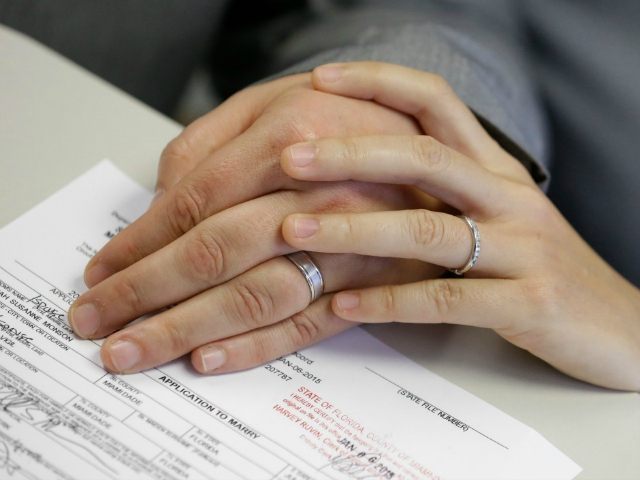A law professor at Jesuit-run Fordham University in New York is appealing for an end to the institution of marriage in America, which he describes as “religious, gendered, and bourgeois.” Ethan J. Leib published his essay in the Fordham Law Review.
The article, titled “Hail Marriage and Farewell,” says Leib was “elated” when the U.S. Supreme Court made same-sex marriage the law of the land on June 26, 2015, a ruling he described as “a victory for rights, for open-mindedness, for love, and for the future.” The decision, in fact, made him feel, at least for a moment, as if he were living “in a modern liberal state.”
Not liberal enough, however. Leib argues that Obergefell v. Hodges, while an important milestone in “marriage equality,” doesn’t go nearly far enough. The next step must be to “disestablish” the antiquated institution of marriage altogether.
Leib suggests that civil government get out of the marriage business, leaving it wholly to the private sphere and only recognizing “civil unions.” Under this plan, he writes, “civil unions would be the only domestic arrangement the state would recognize to disburse benefits to families, to exact taxes upon families, and to administer its family law.”
The effect of this, he argues, would be to disentangle the state from what he has called “an institution that continues to affirm stale gender roles.”
Leib’s evident disdain for marriage is many layered. He asserts that “marriage has been a source of women’s oppression,” that it needlessly “stratifies society,” that it institutionalizes “gender scripts and the normativity of bourgeois domesticity” and that it is a “bourgeois institution that is both out of reach for many poor people” and “reinforces a certain kind of consumer capitalism that is distasteful.”
Leib’s article is par for the course for Fordham, a nominally Catholic university run by the Jesuits with a history of opposition to Catholic teaching. This summer the university made headlines when the head of its theology department, J. Patrick Hornbeck II married another man, Patrick Anthony Bergquist, at St. Bartholomew’s Episcopal Church in Manhattan.
The full embrace of LGBT activism by Catholic universities and law schools does not bode well for the future of Catholic schools or the law profession.
According to Patrick Gillen of Ave Maria School of Law: “There are only a handful of law schools in this country where a law professor could take up the defense of marriage.”
“In many law schools,” he said, “as in countless other institutions and businesses, those who have taken a stand for traditional marriage have been persecuted mercilessly, losing their livelihoods or privileges available to their fellow citizens generally.”
In point of fact, although Leib asserts that Obergefell didn’t go far enough in the dissolution of marriage, he is mistaken. The Supreme Court ruling did not just nudge America toward “marriage equality,” it completely redefined marriage so that it is no longer recognizable.
A Jesuit named Pope Francis, in his recent visit to Philadelphia, warned that the Obergefell decision had redefined marriage in such a way that it is no longer resembles the Christian sacrament of matrimony.
“Until recently,” the Pope said, “we lived in a social context where the similarities between the civil institution of marriage and the Christian sacrament were considerable and shared. The two were interrelated and mutually supportive.”
“This is no longer the case,” he said.
Follow Thomas D. Williams on Twitter @tdwilliamsrome

COMMENTS
Please let us know if you're having issues with commenting.